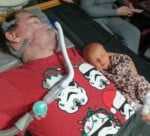The reason I’m writing this now is twofold, firstly after giving my last mental health workshop I suddenly realised I hadn’t once been asked about my mental health during my recent hospital stay, and secondly a talk at the Action Duchenne International Conference I attended at the weekend.
I have been working with a group of people on a mental health workshop for some time now with the support of local charity Barnwood Trust, we have hosted five workshops so far, mainly to people within the trust and it has been a rewarding experience, but it has also reinforced the fact that most people don’t see the link between physical illness and mental health problems. I joined the group originally to support a friend with mental health troubles and was very nervous about being part of it, everyone else in the group had conditions that I saw as far worse than my measly anxiety, panic attacks and undiagnosed depression, my obvious illness was physical and I wondered what I could offer. I have since become friends with the other group members and seeing how they value my contributions has made me far more comfortable, I now believe I can make a contribution, my physical presence in itself is useful for highlighting the fact that people need to look below the surface and not take everything at face value.
But this post is not about the workshop itself, I will do a future post on that and how it has helped people, this post is about my thoughts on the lack of understanding in the medical world of the link between mental and physical health.
During my time in hospital I saw physios, dieticians, surgeons, facial reconstruction surgeons, anaesthetists, renal experts, respiratory experts and many more, but no one in any way related to mental health, this is despite the fact that the medical team knew I was on anxiety medication and that my medical notes clearly state I’m seeing a psychologist regularly! I admit I didn’t ask to see my psychologist, but I was dosed up on medication, in pain and focusing solely on just surviving, but wouldn’t you expect medical experts and nurses to suggest something? Especially after telling someone they were probably going to die or at least go through life changing surgery, what’s more the hospital has a large psychiatric wing attached to it so you’d think mental health needs would be in their minds.
This theme was also mentioned in a talk by DMD Pathfinders during the conference, there is a connection between mental health and chronic illnesses yet it is not mentioned to people when they are diagnosed and often they have to seek help themselves, that’s assuming they even realise what they are going through is mental health related. Medical people generally seem to see something physical and focus everything on that, they dismiss the psychological side as less important or simply don’t see it.
I am not blaming them as such, I suspect it’s due to the way they are trained and a lack of cohesion between different medical fields, it isn’t just the medical side either, I have seen it with mental health professionals too, some see a physical condition and decide that’s the main problem and can’t help.
Things need to change, research needs to be done and people educated, this is one of the things I hope our workshops can help with and also DMD Pathfinders can help educate people on.
Below is a video Barnwood Trust made for our workshop and have kindly said I can share, I talk about my physical and mental health issues in the hope it will promote understanding.
https://youtu.be/TPbCNpPf_S0






Add a Comment Below